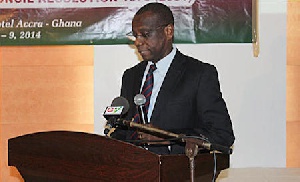Security experts have called for a new category of Interpol notices to target assets of suspected criminals.
The call forms part of innovative tools and practical solutions to fight crime.
Chief Executive Officer (CEO) of the Financial Intelligence Centre (FIC), Mr Samuel Thompson Essel announced this at the opening of a regional workshop on seizure, confiscation and management of proceeds of crime.
It was organised by United Nation’s Office on Drugs and Crime’s (UNODC) Global Programme Against Money Laundering, Proceeds of Crime and Financing of Terrorism (GPML), with the support of Inter-Governmental Action Group against Money Laundering in West Africa (GIABA) and the Government of Ghana.
As part of the three-day workshop, a West African Asset Recovery Interagency Network (ARIN-WA) will be launched.
Mr Essel said at the first Interpol Expert Working Group Meeting in Rome in May this year, delegates also called for monitoring of seized or frozen assets and the establishment of a new public-private partnership to fight cyber crime.
He said the growing trend of crime worldwide indicates that criminals operate across borders with a high degree of sophistication.
“Similarly, funds and other assets generated from criminal activity are moved across borders with unbridled dexterity.
“Criminals share intelligence on timely basis and continue to monitor the counter operations of law enforcement,” he warned.
The CEO of FIC noted that the crucial issues confronting institutions fighting against transnational organised crime include sharing of information across borders, co-operation among themselves consistent with domestic laws, collaboration to trace, seize and apply to court to confiscate criminal assets.
Mr Essel said it appears that sometimes “we tend to collaborate more with jurisdictions outside our sub-region.”
“This trend must change in order to ensure sanity in our society,” he stated.
According to him, intelligence institutions around the world have adopted both formal and informal arrangements towards information and intelligence sharing on timely basis to fight crime.
“For example, under the EU instrument for stability, Nigeria, Ghana, Senegal and Cape Verde have benefitted immensely from EU technical assistance programme which has enabled them to share intelligence under the cocaine route project.”
In a speech read on her behalf, Minister for Foreign Affairs and Regional Integration, Ms Hanna Tetteh said the world was witnessing many forms of crime, including money laundering, human trafficking, extremism and terrorism, that threaten not only the peace but also the stability of countries and the existence of humanity.
She said West Africa must acknowledge the efforts made by the Economic Community of West African States (ECOWAS) to address the prevalence of crime in the sub-region such as illicit trafficking, embezzlement and corruption, which have impacted negatively on governance and human development.
According to her, in spite of this effort, criminal organisations such as Boko Haram in Nigeria, the Tuareq rebels in Mali and Al Qaeda have increasingly become sophisticated in their modus operandi, aided by the ever-growing social media and Information Communication Technology.
She said the initiative by UNODC to facilitate the establishment of ARIN-WA must therefore be applauded.
“Ghana is indeed ready, committed and in full support of this sub-regional body that would serve as a co-ordinating unit for dealing with crime-related assets.”
“In Ghana, the government has established the Financial Intelligence Centre under the Anti-Money Laundering through the Act of Parliament, Act 2008, (Act 749) and as a corporate body to receive, analyse and disseminate financial intelligence in Ghana and abroad, aiming to break the cycle used by criminal groups to benefit from illegitimate profits,” she said.
General News of Tuesday, 25 November 2014
Source: The Finder













